#If Edmund doesn’t come up with new plots and schemes
Explore tagged Tumblr posts
Text
king lear AU where parents respect their children’s boundaries
Gloucester: hey Edmund what’s that letter you’ve got there?
Edmund: oh it’s nothing dw about it
Gloucester: ok son 👍 I respect your privacy 👍
Edmund: …😒😒
—————
Goneril: hey dad can you send away your knights? They’re wrecking my house
Lear: you want me to get rid of my knights??
Goneril: yes please
Lear: well then of course 👍 I’m sorry they wrecked your house :(
#I see Nahum tate’s king lear and do you one better:#Instead of happy ending king lear it’s happy beginning and middle#Likely ends well too#If Edmund doesn’t come up with new plots and schemes#Of course he probably will#Edmund my beloved <3#yet Edmund was beloved.. by me personally#King lear#Shakespeare memes#edmund of gloucester#gloucester king lear#goneril king lear#lear the king guy king lear lmao I don’t have a tag for him
11 notes
·
View notes
Text
Robin Hood Rewatch - 3x04 Sins of the Father
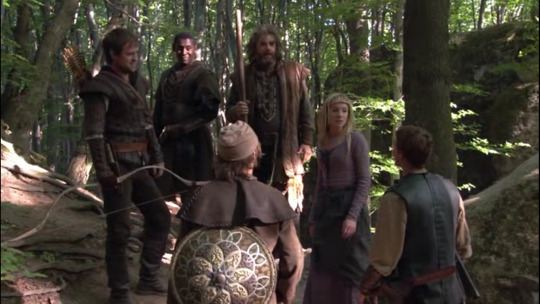
I bet they regret not saving this episode title for later in the season.
But I had absolutely no memory of this episode! I honestly thought this, episode four, was when Prince John/Isabella showed up but no, we have more filler. The only notable event is Kate being outlawed, which I knew happened at some stage, but had zero memory of how. Oh and a plot about a conman father and son pretending to be tax collectors, and hmm doesn’t that seem familiar?
But there’s no actual movement in the overall arc, to the extent that this season even has an overall arc. I mean the season is 1/3 over, and it feels like nothing has happened?
This episode also has the distinction of being one of the few written by a woman - Holly Phillips, although this was her only one. For those keeping track, the others were Bev Doyle (3 eps), Debbie Oates (2 eps), and Lisa Holdsworth (2 eps).
Vaisey’s bookeeper (?) Scrope is working the abacus hard trying to calculate the cash that can be sent to Prince John (still 1000 crowns - guess he didn’t get a discount for turning over Guy, who is again not in this episode).
He does get mentioned though, as Vaisey is paranoid that Guy is in London “gallivanting with Prince John, scheming against me” - well, you’re the one who sent him there ! ¯\_(ツ)_/¯
Scrope provides exposition that the new tax collector will be arriving, and his name is Rufus.
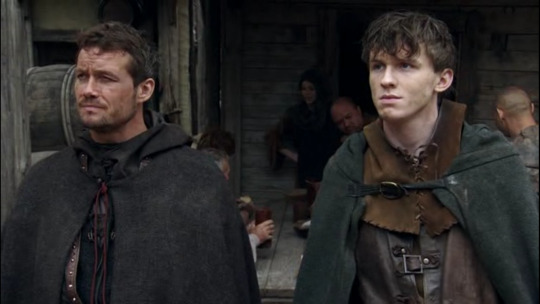
And his son, apparently, whose name is Edmund. Yeah. these dudes look trustworthy. But the Sheriff really couldn’t be fooled by a fake father-and-son tax collectors again, could he?
Meanwhile, the gang steal the Sheriff’s winter food store by setting loose some bees, and Rufus watches with interest and compliments Robin on the slight of hand.
He then reveals to Vaisey that Nottingham is his home town, and he’s come back to make them pay. DUN DUN.
He proceeds straight to Locksley to swing his dick around make an example of people who don’t pay their taxes. When Kate makes a comment that they do, he destroys their pottery stall, and the kiln explodes, starting a fire.
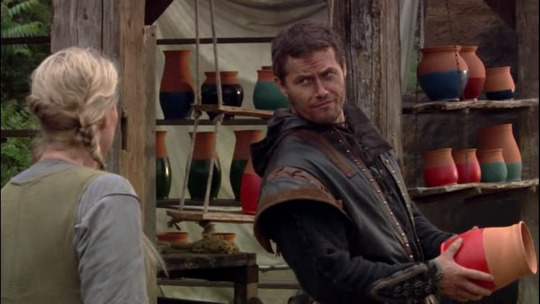
Now, this has been bugging me since the start of the season, but the pots could not look more industrially made right down to the perfectly glazed paint, so perhaps nothing of value was lost.
Kate stands up to Rufus, and honestly I think this is a pretty fair reaction and actually pretty steely of Kate to hold firm. However, when Rufus sees she won’t back down, he threatens to hurt Rebecca and she is cowed, agreeing to go to Locksley Manor to make him “smile.” Ah, our old friend, Threat of Sexual Assault.
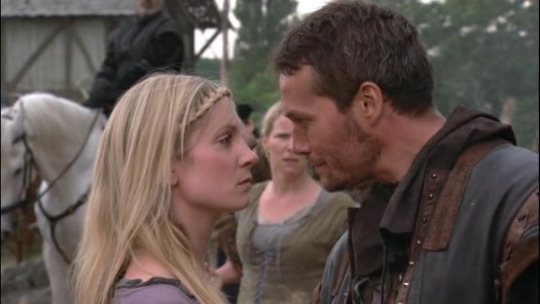
I actually think this is an interesting position for Kate to be in - she has berated Robin for causing collateral damage by standing up to Vaisey, and now she’s experiencing the fallout of her own bravery. Will this prompt any self-reflection or character development on Kate’s part? Of course not!
There’s a very creepy and uncomfortable scene where Rufus makes Kate dance for him. A discomfort shared by Edmund, who excuses himself.
John thinks he knows Rufus from somewhere, but they rush of the Locksley when they hear of the fire. He tells Robin that he’s the new tax collector and started the fire, and Robin wonders where Guy is before rushing off to the Manor when he hears Kate needs help.
She pulls a dagger on Rufus just as Robin and Much barrel in through the windows.
A trope I really hate is someone in immediate danger proclaiming “I was doing fine on my own!” when another person arrives to help. I just hate it.
Now, maybe Kate could have fought Rufus of with that dagger, but he quickly overpowers Much who has a sword, so maybe not. In any event, Robin and Much weren’t to know she was “doing fine” so blaming them for Rufus forcing her into hiding kind of eats away the sympathy for her in the moment.
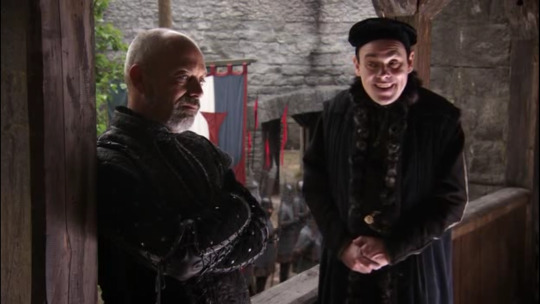
Scrope convinces Vaisey to send his guards to the Earl of Northumberland in return for gold, leaving him unprotected in the castle.
Kate says a very sweet goodbye to Maggie, who still has not spoken a word.
“First you get my son killed, now you take my daughter.” Rebecca continues to be The Worst. But Robin takes the undeserved blame very graciously, promising to look after Kate.
Allan spits some facts, but I think it’s meant to come across as flirty banter?:
Allan: You’re so angry we saved you Kate. Seriously, what were you going to do? Stab the guy?
Kate: Yeah, if I had to. No great loss to the world.
Allan: We helped you. We’re giving you a bed for the night. Aren’t you even slightly grateful?
Kate: Ah, I’m so grateful! Thank you all for ruining everything! I can really see why you’re so legendary.
Allan: Well aren’t you sweet and charming, eh?
Kate: And aren’t you full of yourself?
Allan: Full of myself? Oh now you’ve gone too far, Kate. I’m wounded! Truly my heart is broken!
I do actually quite like this exchange, I just wish they were going to remain foils - that would be a more interesting dynamic and undercut the overselling they’re doing of Kate - imo the key to any lead character is having another character that calls them on their bullshit.
Robin expresses concern for her that diffuses the sniping - honestly he feels rather paternalistic towards her at this point (twice referring to her a “little girl” in earlier scenes).
Much is still enamored with Kate for reasons I cannot fathom, and admits that she turned him down, but consoles himself that she thinks they (“the gang - not just Robin”) are legendary. No, Much. No. She’s been very clear, it’s time to back off.
Vaisey sends the guards away, and the castle goes into lockdown, while Rufus roughs up the locals in Nottingham.
He and Edmund find his father’s old butcher’s shop, which we learn was taken from him when Rufus was seventeen. The same age as Edmund - placing that event at least seventeen years before this episode, which is important to remember for a rant I’m going to go on later.
Rufus berates Edmund him for being weak i.e. not wanting to watch people suffer. Why are we spending so much time on these people? Rufus is getting more character exploration than Allan, John, and Much put together!
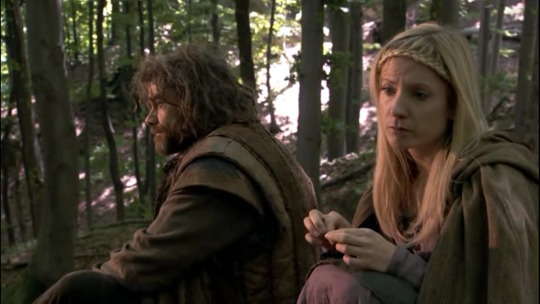
Back at camp, John resumes his role as resident Dad and comforts Kate that she’ll get used to being an outlaw. She asks if he ever gets used to being away from his family, and he says no, but that whatever happens she’s not alone. Now, this would have been an excellent time for John to actually talk about his family, to give some follow up to his breakdown/deathwish in 2x12, but he doesn’t, because we can’t have nice things.
The gang traps Rufus and Edmund in a stable, and Kate’s contribution is to trip Edmund as he tries to run away. Which is fine, except the TWO closeups we get of John and Tuck sharing impressed looks and this is what I mean by overselling a character. Just let Kate contribute without comment/emphasis, like everyone else does! Unless it is truly exceptional, which sticking out your leg to trip someone is not.
Honestly, the best critique I’ve ever seen of this is the Poochie episode of The Simpsons, something every writer should watch before introducing a new character to an established group, but clearly this seasons producers took as an instruction manual.
Although to be fair, I don’t think Kate is too bad in this episode.
Anyway there’s a fight, and Robin, Much, John and Tuck escape having captured Edmund (Robin riding backwards on his horse shooting arrows, which is impressive but gets less emphasis than Kate’s ability to trip someone over), and Rufus escapes having captured Kate and Allan.
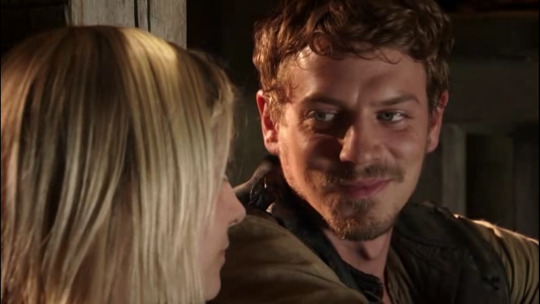
The latter are imprisoned in the old butcher’s shop, and there is some bad banter. However, the thrust of the scene, in which Allan does in fact successfully distract Kate from anger at being captured and impending death, to annoyance at him, is quite nice. Allan is a good egg.
Edmund is tied to a tree while John asks for his family name, certain he knows Rufus. Hey, remember in 1x06 when the fake tax collector’s son was also captured by the gang and tied to a tree for interrogation?
The gang leave Tuck in charge of Edmund, and he uses Ye Olde Polygraph (i.e. feeling his pulse) to tell that he’s lying, then Ye Olde Talk Therapy to help him see that kindness is not a weakness.
We get a close up of Tuck sensuously rubbing sage leaves into a rabbit and it makes me laugh. Oh director Alex Pillai, what weird choices you make.
Oh, so Scrope was in league with Rufus because he threatened his wife, and Vaisey finds Scrope tied up and figures it out, realising that he’s all alone in the castle without protection.
“Underneath this harsh surface there’s just more harsh surface.” LOL.
Vaisey stabs Scrope, so bye bye oily henchman.
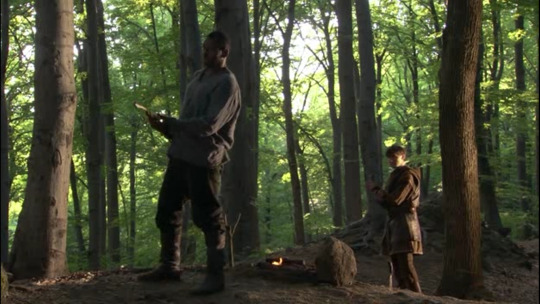
Tuck tempts Edmund with the chance to kill him, but he instead chooses to eat with Tuck. Look, it’s a nice scene for Tuck, and there’s some good stuff here about fathers and sons, the cycle of violence, the power of choice etc, and I wish I cared more but I don’t. Because it feels like there needs to be a parallel to one of our main characters - the plot of the episode should serve the overall character narrative, otherwise what’s the point? I think it’s pretty clear that the upcoming plot about Robin’s father had not been decided on yet, since it would have been the perfect episode to set that up.
Or it could have been about Kate choosing not to follow her mother’s example of blaming everyone else when things go wrong, and instead deciding that she can help her family best by working with the gang. But that would require Kate to have an ounce of self reflection in that scene with Allan, and instead all it is is her being angry then mopey, and him cheering her up.
Robin tells Rebecca Kate’s been captured and promises to save her, while Much finds a butcher’s hook, and this jogs John’s memory of the old butcher, a good man, and his son, who was not.
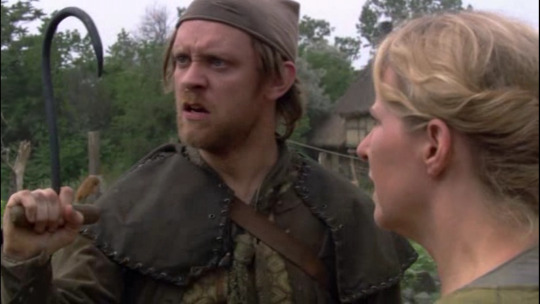
John and Rebecca recall a wedding from many years ago, and...wait, WHAT!?! I’m sorry, I refuse to accept that Rebecca has lived in Locksley for long enough to remember a time before John being outlawed (at this point around 13 years), and presumably when Robin was still a boy since he has no recollection of the family name or the circumstances.
Now, it’s perfect for John to drop some knowledge here, I like it when they let John be smart! But why include Rebecca in this scene it all, because it seriously strains credulity that she’s a Locksley lifer. I mean it’s just completely unbelievable based on what we’ve been presented so far.
This also means that Kate has lived at the very least most of her life in Locksley, i.e. lands under Robins control, so there is absolutely no way he would not have recognised her in 3x02. Robin remembers everyone! It is his thing! He greeted each and every villager by name in 1x01 after five years away! Ugggh this infuriates me.
It also makes the impending Robin/Kate nonsense even worse! It’s unclear if the family are serfs or not (I assume not, since Kate tells Matthew to “find them somewhere better” in 3x02) but there is absolutely a gross power dynamic between Earl and peasant, for all that Robin has technically lost his title (he has certainly called himself the “true lord of Locksley” more than once).
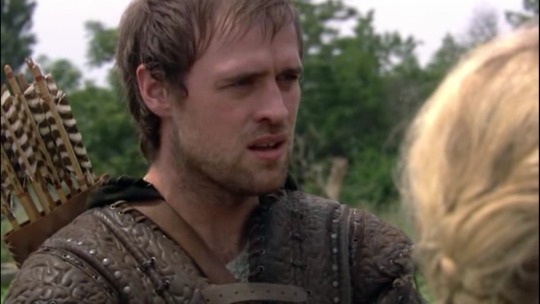
Anyway, Rufus stole the money from the bride and groom from the wedding...and I’m sorry, I can’t get over this. Robin doesn’t remember?!? A wedding in his own village where a major scandal occurred?
I suppose it has been at least 17 years, making Robin very likely less than ten at the time, but he was never even told about this extremely scandalous event? Unless all those concussions from season 1 are finally catching up with him.
Robin figures out Rufus would “go home” to the butchers, and rescues Allan and Kate. They fight, and Tuck and Edmund arrive to stop Robin killing him. Robin’s “no kill” policy has become, as articulated by Rufus earlier in the episode: “no killing unless he has to”. The “has to” is being interpreted very loosely it seems.
Vaisey arrives, and recalls that Rufus’s father Daniel was his “very first execution” and excuse me but this timeline is extremely fucked up. Vaisey only became the Sheriff while Robin was away, at most 8 years earlier, but Daniel was executed because he admitted guilt to save his son. Was this the same wedding theft we’re talking about? It can’t be, because Edward would have been Sheriff at that time, but John says Daniel and Rufus ran off after the wedding and weren’t heard from again, which again doesn’t make sense, because you’d think John would have known that someone was executed for the crime?
Unless this was meant to be a subsequent theft happening in a different town where Vaisey was in charge, but no, that doesn’t work either based on Rufus declaring that “this town took my father from me” and prompting Vaisey’s memory by urging him to remember “the old butcher”.
This whole backstory is a mess.
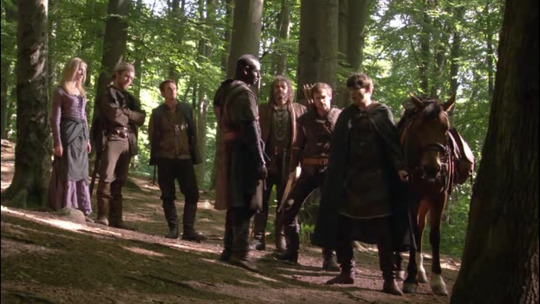
Edmund stands up to Rufus, who then tries to kill him, so Robin shoots him, and I am once again asking what was the point of this episode was.
Back in the forest, Edmund sets off on his own. Kate, sadly, did not die on the way back to her home planet, but agrees to stay with the gang after Robin in particular says he wants her to. At this point it seems more about his sense of obligation and general kindness, but Kate gives him heart eyes in return.
Allan and Kate banter again, while Much looks forlorn and makes a very gross comment that he saw her first.
Love quadrangle, everyone! What a joy.
21 notes
·
View notes
Text
Miracle on 34th Street (1947) - Review & Analysis
What a weird, wonderful movie. Miracle on 34th Street is quite possibly the oddest Christmas movie I’ve ever seen. In part this is due to the fact that some stuff just doesn’t age well. How many old, strange men are you willing to let your seven-year-old daughter hang out alone with, Ms. Doris Walker?! But also it’s weird because because despite its typical Christmas-movie themes of faith/belief, true love, family, etc… it’s a wholly unique film that doubles as a legal drama!
This was my first viewing of the perennial classic, a film which started as a story by Valentine Davies and was adapted for the screen and then subsequently directed by George Seaton. Though baptized a Roman Catholic, Seaton himself grew up in a Jewish neighborhood of Detroit. He even had a bar mitzvah. I wonder how much of Seaton’s upbringing affected the final product we see. The central theme of holding faith in something that doesn’t make sense to those around you probably resonated strongly for the director who as a kid who became interested in a religion that was foreign to both of his Swedish immigrant parents.
From a direction standpoint, it’s fairly by the books and of its time, with a few notable exceptions, one being the opening credits sequence which shows a lone man walking slowly about the NYC streets from behind. He’s dressed in all black and we have no idea who he could be. He could literally be anyone in the world. Then all of a sudden, like magic, his face is revealed: the man we’re following is Santa Claus! Or, at least it looks a whole lot like him. What is Santa Claus doing in New York? Is this even Santa Claus?
These are questions that end up being central to the movie and just straight up never get answered. I loved that writing choice. The writing is the first of the film’s three big stars. This film won the Oscar for both best story and best adapted screenplay and it deserves every ounce of those awards. The story is so sublimely clever. Put shortly, the movie is about a man who claims to be Santa Claus and due to his uncanny resemblance to the jolly holiday figure, his natural aptitude for talking to children, and his almost savant-like knowledge of toy stores in Manhattan, he gets hired to be the mall Santa for Macy’s flagship Manhattan store. However, not everyone is as convinced that he is the real Kris Kringle. Certainly the Macy’s company psychologist does not. An uptight and unpleasant man, he (like others) thinks Kringle is utterly delusional but (unlike others) he also thinks these delusions presage future violence whenever inevitably others may challenge Kringle on this delusion. The psychologist thus schemes to get Mr. Kringle committed to *cue thunderclaps* Bellevue!
What ensues is a legal battle. I can’t imagine any other Christmas movie whose climax ends in a courtroom but it’s an incredibly satisfying thing to watch. We have the idealistic lawyer, Mr. Fred Gailey, who believes that Kringle, while clearly delusional, poses no actual threat to the community and actually does the community a great service in spreading kindness. Nevertheless, has to prove that Mr. Kringle is legally THE Mr. Kringle lest Kringle spend the rest of his life in the looney bin. Note… I have a very healthy and “modern” view of mental health, and would never use the term “looney bin” to describe today’s mental health hospital… but I use the term here because the images we get in the film of Bellevue’s inpatient psych ward are of sedated men in all-white clothing… in other words the movie certainly thinks of being in a psych ward as a looney bin, which adds a bit of dramatic tension to the story.
There’s certainly some not-so-subtle condemnation of psychology going on this movie (at least of the kind practiced by the Macy’s psychologist, Mr. Sawyer (a snivelling Porter Hall)). This was coming at a time when increasingly science was taking the place of religion, so it makes sense that psychology would be an enemy in a movie about faith and clinging to things that don’t make sense. The trial over the existence of Santa Claus almost serves as an inverse Scopes Monkey trial; Kringle even ironically compares his lawyer to Clarence Darrow, the lawyer on behalf of science.
What this movie nails so absolutely perfectly is that honestly… I don’t know if Kringle really isn’t Santa Claus. I’m not claiming that Santa exists in the real world, but in the world of this film, it’s really not obvious whether the film leans one way or another. That’s an ambiguity that tends to make art shine when it’s present. We see through Gailey’ legal maneuvering that the legal defense for Santa Claus’ existence is tenuous at best. At one point he calls the prosecutor’s child to the witness stand to argue that Santa Claus must be real since that is what his Dad (the prosecutor) has always told him. Therefore it seems like the film’s psychological explanations are probably the most likely. Yet at the same time… when a little Dutch girl comes to see Santa at Macy’s because she can “just tell” he’s the real Santa… why else would Kringle know Dutch songs about Santa off the top of his head? Why does an old man who lives in an old folk’s home on Long Island know so much about Manhattan’s toy stores?
And then there’s the more practical questions about Santa lore. Why is Santa in New York? He says he was born in the North Pole… so why did he leave? If he’s real, then why does he need to direct parents on where to buy the best toys? Is it merely that the world has outgrown him?
There’s also a whole economic piece of the script that I won’t even fully touch on. But basically Kringle in attempt to do right by parents, doesn’t merely recommend toys from the Macy’s toy department, but lets them know about better deals on toys that are located in stores elsewhere in Manhattan, including those that are rivals of Macy’s! This policy is such a hit with customers, it ushers in a revolution in department store policy, with department stores across the nation vying to extend more goodwill to customers. As I said, there’s something in there about the power of the free market and how capitalism doesn’t have to be evil... but I’ll leave it there and return to the central questions of the film. Like... does Santa Claus exist?
I don’t know! But the film raises really interesting questions and just leaves them there for us to sit with. Everything that the film tells us points us to the common sense conclusion that this man is NOT the genuine Jolly fellow… yet we want to believe there’s something more and that’s what makes this film so special. We literally as the audience go through the same mental charades as the characters in the film.
Thus far, I’ve attributed this brilliance to the plot, but there’s another absolutely vital element: the performance by Edmund Gwenn as Kris Kringle. This guy deserves every ounce of his Oscar for his performance. There’s not a second that he’s on screen that he doesn’t ooze charisma and charm. This whole movie would fall apart were it not for him, good plotting be damned, since we need to believe, even for mere fits and flitters, that this man is Santa Claus.
Never is he more convincing than when he interacts with children. There’s the absolutely magical scene with the little Dutch girl I mentioned above, but it’s when Kringle chats with little Susan Walker (played to heart-melting perfection by nine-year-old actor Natalie Wood whose got a stink face that never ceased to make me chuckle) that this movie achieves greatness. Though the trial scenes put the theme of faith vs. psychology at the forefront, the real heart of this movie is the conflict of faith vs. practicality. Little Susan is raised by her mother (and her Black nanny/house-caretaker who gets depressingly little credit… or screentime), and her mother Doris Walker (Maureen O’Hara) is a thoroughly practical women. She’s a high-up exec at Macy’s, and seemingly one of the only women to be in such a position. As such, she’s a unique character for her time. Rigidly pragmatic, she eschews any and all attempts at fun and imagination for her daughter (as well as for herself). We get the sense that a different film, a different story, might dive deep into Walker’s struggles as a single mother in the 1940’s trying to be taken seriously in the business world. In a sense, she’s a forerunner to Faye Dunaway’s character in Network. She was clearly hurt by romance in the past (she and her husband divorced, which I imagine was rather scandalous at the time), and this fear of getting hurt by romance is what compels her to teach her daughter to avoid the stuff completely.
Clearly, there’s some cool gendered stuff going on here. Imagination, romance, faith: these are all things that are stereotypically more female-coded, while business, pragmatism are more male-coded. You inherit your father’s name but your mother’s religion as the old tradition went. And in our society at least, the latter (pragmatism/business) is supposed to make you successful and get you places… the former (faith/romance) does not. Yet in this movie, we have idealism and romance of our male lawyer Fred Gailey (John Payne) and the pragmatism of our female businesswoman Doris Walker. It’s a fun play on typical gender norms, but more interesting is to see how this duality plays out in the development of little Susan under the dual influences of her mother and the combination of Misters Gailey & Kringle.
Natalie Wood goes down in the pantheon of all-time great child actors, up there with the kid from Kramer vs. Kramer. She’s precocious but not in a way that’s off-putting. The way she evaluates the Macy’s Thanksgiving Day parade in such a matter-of-fact way is hilarious, and as I mentioned the stink eye she gives Kringle when he tries to tell her that he’s Santa is nothing short of perfect. Over the course of the film, we see her more harsh nature melt away and she becomes a kid. It’s a beautiful reminder of that childhood only comes once in a lifetime. If this movie shows us nothing, it’s how hard it is to maintain a sense of levity once one becomes an adult. We have to start worrying about what our bosses might think, what the press/public might think, what voters(!) might think. Never again will it be fully OK to have your heads in the clouds and believe in nonsense, so why take that away from children.
As much as this is a perfect film, I could have done without the romance plot. Mostly because it seems unnecessary. Doris seems to change in her attitudes towards Kringle and towards raising her daughter that constitute enough character growth thata having her all of a sudden fall head over heels for Gailey just seems forced. For that matter… Gailey’s a weird dude. This movie romanticizes a weird, creepy type of romance where Gailey spends time with a small girl just to get time with that girl’s mother. Walker and Gailey are such opposites and share no on-screen chemistry, that I just didn’t buy the plot.
But that’s OK. It’s a small blemish on an otherwise wonderful film. It hits different emotions than, say, It’s A Wonderful Life, but it’s magical all that same, and one that I can actually imagine children wanting to watch. It’s unceasingly clever plot, matched by a once-in-a-lifetime performance by Edmund Gween as Kris Kringle and a great child actor performance from Wood make this a must-see movie for any holiday movie fan.
***/ (Three and a half out of four stars)
#miracle on 34th street#edmund gwenn#maureen o'hara#john payne#natalie wood#george seaton#christmas movies
3 notes
·
View notes
Text
The Case for (Imagined) Queerness in the Works of Jane Austen
As 12 years of mandatory English classes taught us, a book’s impact and importance depend on a ton more factors than just “what the author decided the plot should be.” Every story is contextualized and processed by its individual readers. And if you think you understand the power of this reader/text relationship like the bookish queer youth does, oh boy are you out of your league. There’s an entire ocean of characters out there, and so shamefully few of them are non-hetero. Fan fiction, fan art and extensive Tumblr analyses abound trying to engineer Queer Subtext for any book, movie or television show you can imagine. LGBTQ folk are experts at collecting scraps of dialogue, stray looks or ambiguous moments, pinning them to the cork board of Accidental Queer Representation and connecting them with the red yarn of, uh, Extremely Biased Interpretation? Much like the metaphor in that last sentence, these cobbled-together narratives are often flimsy at best, but we stand behind them with conviction. See? I’m a weathered professional at holding together a trembling, papier-mâché construct despite all evidence to the contrary! Plenty of heteronormative franchises and stories have been given new life by the queer reader’s re-programming, but I have felt mostly alone in my bold quest to Gay Up the works of Jane Austen. These stories all at least partially revolve around the stirrings of Heterosexual Love in the hearts of young women and naturally have been favored mostly by my exceedingly hetero, female-identifiying peers. Therefore I have taken it upon myself to do this heavy lifting on behalf of the Queer Agenda. I have labored intensely for many years, and now at long last I present my findings on a few of Jane Austen’s most notable works. Mansfield Park for Queer Youth Ah, Mansfield Park. The story of a mousy, impoverished heterosexual young woman fending off the advances of a wealthy and charming young heterosexual man in order to ultimately commit to an austere and boring heterosexual young man. Or is it? Exhibit A: Mary Crawford, The Original Girlcrush When Miss Mary Crawford and her wealthy and charming heterosexual brother Henry move into the neighborhood, young Fanny Price and her better-off cousins the Bertrams find their lives turned upside-down. Perhaps not quite in the way you would think. Miss Crawford’s beauty did her no disservice with the Miss Bertrams. They were too handsome themselves to dislike any woman for being so too, and were almost as much charmed as their brothers with her lively dark eye, clear brown complexion, and general prettiness. (Chapter 5) The first half of this excerpt is a very informative piece of intel on the lives of conventionally attractive, straight women. (Finally, Taylor Swift’s #girlsquad makes sense!) The second half, however, is queer as hell if you just believe hard enough. “Almost” as much charmed? Come on, Austen. Just give it to us straight. (Uh, no pun intended.) Everyone is in love with Mary Crawford, which is beautiful and tragic. The Bertram daughters are bound by custom and convention to marry men, but in the depths of their hearts, they clearly yearn to leave it all behind and run away with Mary. Exhibit B: Wait, Is Mary Crawford after Edmund or Fanny? The ongoing flirtation between Mary and Edmund is explicit enough. While they turn out to be ill-suited for one another, the initial sparks between them cannot be denied. Only slightly more subtle, however, is Mary’s fascination with Fanny which leads the two women to spend the majority of their free time together. Such was the origin of the sort of intimacy which took place between them within the first fortnight after the Miss Bertrams’ going away—an intimacy resulting principally from Miss Crawford’s desire of something new, and which had little reality in Fanny’s feelings.”(Chapter 22) Mary, girl, we’ve all been there. Experiment away! Bless Jane Austen for this completely unintended example of much-needed bisexual representation. Exhibit C: Fanny Just Wants a Beard I have always found protagonist Fanny Price’s rejection of rich, effusive and affable Henry Crawford in favor of her stoic and dare I say withholding cousin Edmund Bertram to be one of the most frustrating heterosexual choices in literature, which is already full to bursting with the baffling entanglements of straight people. Ostensibly, Fanny has chosen a life of quiet morality as worth more to her than indulgence and having fun and being happy. And at first glance, the moral of this story seems to be the bland and inoffensive message that it’s actually okay for straight women to love solemn contemplation and quiet alone time and reading indoors on a rainy day. Oh, and being sexually attracted to one’s first cousin too, obviously. But is there perhaps a more original and insightful takeaway from this novel? Of course there is! Arguably, a queer reading of Mansfield Park is the only thing that would explain why in the end, Fanny falls for the least threatening or exciting man she has ever met. It also explains her intense discomfort with male attention. (She’s described in Chapter 21 as “almost as fearful of notice and praise as other women were of neglect.”) She’s not looking for sex appeal or chemistry, because she knows she will never find them in a man, nor does she want such a thing. The best case for Fanny is a dependable and amiable enough life partner with whom to pay the bills, share in life’s various duties and sleep in separate beds. Edmund is certainly that. Emma, Obviously in Denial In addition to having the most personally relatable protagonist I have ever encountered, Emma is coincidentally also the easiest of Jane Austen’s works to jam into a queer-shaped mold. You can read a good 85% of this novel as the story of a lady-loving lady in very deep denial struggling with the heterosexual inclinations of all the women she cares for. Unfortunately things go a little off the rails when Emma finally realizes her love for Mr. Knightley, which is difficult to handwave away seeing as how it is actually a rather compelling Heterosexual Romance. We’ll just ignore this minor detail that is arguably the culmination of the entire novel and focus on the rest. Exhibit A: Feelings? For Men? We are often reminded in this book that Emma has little to no interest in ever marrying. And why would she? She does not lack for money or status. Her only reason to marry would be True Hetero Love. “I have none of the usual inducements of women to marry. Were I to fall in love, indeed, it would be a different thing! but I never have been in love; it is not my way, or my nature; and I do not think I ever shall.” (Chapter 10) Okay but is it not your nature to be in love or to be in love with men? Maybe this requires just a bit more introspection, Emma. Indeed, let us examine Emma’s attempted quasi-relationship with Frank Churchill. Emma realizes that she feels left out of all the fun watching her friends fall in love and circle through flirtations and makes the decision to get a crush on Frank with the aim of adding a little excitement to her life. (Relatable!) She notices that there seems to be something missing in her feelings for Frank, but she boldly soldiers on through the motions of being In Love so as to better fit in. Eventually, even Emma, queen of self-delusion that she is, cannot continue to pretend to love a man as anything more than a friend. But, on the other hand, she could not admit herself to be unhappy, nor, after the first morning, to be less disposed for employment than usual; she was still busy and cheerful; and, pleasing as he was, she could yet imagine him to have faults; and farther, though thinking of him so much, and, as she sat drawing or working, forming a thousand amusing schemes for the progress and close of their attachment, fancying interesting dialogues, and inventing elegant letters; the conclusion of every imaginary declaration on his side was that she refused him. Their affection was always to subside into friendship…When she became sensible of this, it struck her that she could not be very much in love. (Chapter 13) Because “I can like Men if only I just try hard enough” has always worked out! Exhibit B: I Only Sabotaged My Best Friend’s Relationship For Her Own Good Who among us hasn’t vehemently encouraged our dearest friend Harriet to turn down the advances of a perfectly lovely boy whom she likes very much ostensibly because he’s not good enough but actually because lurking in the deepest recesses of our subconscious, we could not bear to see her with someone else? This is so classic, I could rest my case right here. I probably spent my entire teenhood trying to subtly manipulate my secret lady crushes into dumping their boyfriends. “I lay it down as a general rule, Harriet, that if a woman doubts as to whether she should accept a man or not, she certainly ought to refuse him. If she can hesitate as to ‘Yes,’ she ought to say ‘No’ directly. It is not a state to be safely entered into with doubtful feelings, with half a heart. I thought it my duty as a friend, and older than yourself, to say thus much to you. But do not imagine that I want to influence you.” (Chapter 7) I would never tell you what to do! I’m just saying maybe think about it. And while you’re thinking about it, think about the fact that you’re thinking about it. If you really loved him, would you even need to think about it? Makes you think, doesn’t it? Exhibit C: Serial Monogamy On the topic of Harriet, let’s take a closer look at a pattern of behavior Emma seems to set up. She was exceedingly close to Mrs. Weston, her old governess-turned-best-friend before this woman had the nerve to move out and get married to a man. Emma, drowning in sorrow at the loss of this relationship, cannot handle being single and working on herself for a while, therefore she immediately turns her faculties to selecting herself a new girlfriend. When Emma decides that Harriet shall be her next life partner, she cleaves to her wholly and immediately. Harriet must accompany Emma on all her errands, must call on her nearly daily and must attend every party Emma attends as well. The poor girl doesn’t know how to exist without being in the constant company of a woman who adores her. Have I mentioned how relatable Emma is enough times yet? Pride and Prejudice and Homosexuality Yes, Pride and Prejudice is perhaps the most Heterosexual piece of literature ever written at first glance, but please! Do not doubt my ability to make Austen’s most enduring triumph Extremely Gay. I told you I was a professional. By the time my case is finished, you will see that Pride and Prejudice is one of the queerest classic works in the canon. Exhibit A: Uhhh, Why Do Darcy and Bingley Have to Be Together All the Time? Darcy has Pemberley. Bingley has enough money to buy any property he pleases. There is no reason these boys need to follow each other from estate to estate, attending parties together, traveling to all the same boroughs. Darcy, if you hate the country so much, why don’t you just go live at home in your home that you own? You know, the home that everyone constantly talks about how incredible it is? The home you can just ride a horse over to right now? That home? Darcy gets a lot of guff for convincing Bingley not to propose to Jane. And yeah, that screams Jealous Secret Crush on Darcy’s end. But one must also wonder why Bingley would have been so very easy to persuade. If he truly wanted to marry Jane, I think it would have taken more than a slight nudge from his platonic best bud to ghost her the way he did. I mean, he didn’t just stop answering her texts. He moved himself and his family out of town. However, it doesn’t seem quite so inexplicable to dump one’s beard at the urging of one’s Secret Boyfriend now does it? Exhibit B: Everyone Is Gay for Georgiana “I really do not think Georgiana Darcy has her equal for beauty, elegance, and accomplishments; and the affection she inspires in Louisa and myself is heightened into something still more interesting…” (Chapter 21) I swear to God, no one in this book will ever shut up about Georgiana Darcy. We get it! She’s so very beautiful and kind and charming and talented! The Bingley sisters practically salivate over her. Lady Catherine admires her in her own grumpy old elitist way. Elizabeth finds her fully delightful. Everyone is obsessed with Georgiana. She’s like the Shane McCutcheon of Regency England. Exhibit C: Relax, Elizabeth, People Get Married. Elizabeth has decidedly no interest in marrying the human embodiment of Oblivious Mansplaining, Mr. Collins. Elizabeth’s best friend Charlotte Lucas, however, seems to think the constant stream of ignorant babble is worth the cash money. So she locks it down, infuriating Elizabeth. She had always felt that Charlotte’s opinion of matrimony was not exactly like her own, but she had not supposed it to be possible that, when called into action, she would have sacrificed every better feeling to worldly advantage. Charlotte the wife of Mr. Collins was a most humiliating picture! And to the pang of a friend disgracing herself and sunk in her esteem, was added the distressing conviction that it was impossible for that friend to be tolerably happy in the lot she had chosen. (Chapter 22) Lizzy. We get that you weren’t into him, girl, but why are you, like… so upset about this? Could it be that your dearest partner and secret love Charlotte has accepted a Heterosexual Union. And immediately after you yourself made such a display of rejecting one? Ouch! Sense and Sensibility Guys, I tried with this one. I really did. But all the women in this book are related and also obsessed with dudes. I thought I could stick it to the straight people, but I must regretfully concede that this task is beyond even my expertise. If anyone has a queer angle on this one though, please contact me immediately. We queers have always been around, even when every offshoot of culture has tried to erase us from existence. Yeah, it’s super fun to retroactively barge our way back into old literature. But it’s also a much-needed assertion that we exist, we matter and we deserve to see ourselves. Even in light-hearted novels about manners and marrying rich and falling in love with one’s first cousin. Ashley Chupp is a Chicago-based writer, crossword enthusiast and frequent crier at the local Trader Joe’s. Gif 1: fibu.tumblr.com Gif 2: teenvogue.tumblr.com Gif 3: BBC Gif 4: bringmybooks.com http://dlvr.it/PZ94CB
5 notes
·
View notes